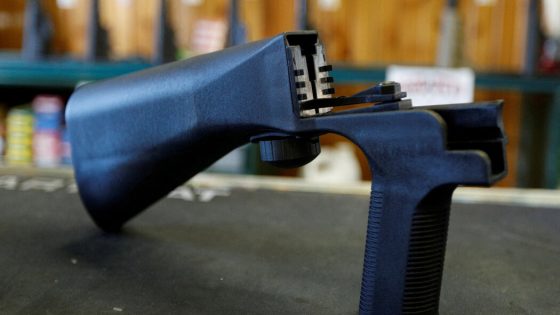After a gunman in Las Vegas killed 60 people at a concert in 2017, officials focused on a gun accessory known as a bump stock, a device that allows a rifle to fire at nearly the rate of a machine gun. Bump stocks were banned by the Trump administration after that mass shooting.
But when the Supreme Court last week struck down that ban, which had been a rare victory for gun-safety advocates in recent years, it had the potential to open the door not just to bump stocks. The ruling could also undercut President Biden’s efforts to restrict other gun accessories that give semiautomatic rifles rapid-fire capabilities, lawyers and gun-policy experts on both sides of the gun debate said.
The devices are replacement triggers known as “forced-reset triggers” or “wide-open triggers” that allow shooters to fire more than 900 rounds in a minute with one continuous squeeze, federal officials say.
In March 2022, four years after the ban on bump stocks was issued, the Bureau of Alcohol, Tobacco, Firearms and Explosives also imposed restrictions on some of these trigger devices. The agency said in a letter at the time that the devices effectively turned semiautomatic weapons into prohibited machine guns.
But now, lawyers and experts said that those restrictions could be upended by the Supreme Court’s 6-3 ruling overturning the ban on bump stocks. Immediately after the court issued its ruling on Friday, lawyers for gun-rights groups suing to overturn the trigger restrictions filed a letter citing the bump-stock decision as a new authority that “weighs directly on a central question in this case.”
That question is: What defines a machine gun?
Machine guns are largely illegal, and have long been tightly restricted under federal gun laws stretching back to the 1930s. The federal government has argued that accessories like bump stocks and forced-reset triggers essentially convert semiautomatic rifles into fully automatic ones.
Bump stocks allow a rifle to rapidly slide back and forth as it fires, harnessing the gun’s recoil to create a fast burst of shots. Forced-reset triggers work by quickly snapping a rifle’s trigger forward after it is pulled.
The devices are among a niche group of modifications that allow guns to shoot faster, sometimes with deadly results.
The gunman in the Las Vegas concert attack, the deadliest mass shooting in modern U.S. history, had 14 rifles outfitted with bump stocks. The shooter who killed 19 children and two teachers at a school in Uvalde, Texas, in 2022 had a “hellfire” trigger device, though he did not appear to have used it.
“The end result is similar,” said David Pucino, legal director of the Giffords Law Center, a gun-violence prevention group. “From the perspective of the shooter, it’s automatic fire.”
But Justice Clarence Thomas, writing for the court’s conservative majority, said that “a semiautomatic rifle equipped with a bump stock is not a ‘machine gun’ because it cannot fire more than one shot ‘by a single function of the trigger.’”
Gun-rights groups and sellers of trigger accessories seized on that line, saying that it gave them a clear path to argue that the A.T.F.’s 2022 decision on forced-reset triggers should also be struck down. They argue that the mechanism of a forced-reset trigger differentiates it from a true machine gun, both practically and in the eyes of the law.
The A.T.F. declined to comment, citing pending litigation.
“This is one of the key legal arguments we’ve been making from day one,” Lawrence DeMonico, the president of Rare Breed Triggers, a manufacturer of the devices, said in a video message to supporters. “It is an amazing ruling.”
He added that the court’s decision would have “a direct impact on our efforts to end the A.T.F.’s illegal attack on forced-reset triggers.”
Gun-control groups said that the Supreme Court’s opinion in the case, Garland v. Cargill, was unlikely to give any legal cover to one illegal subset of these devices known as switches. Switches convert semiautomatic handguns into automatic weapons, and have been blamed by police officials for making guns deadlier and putting bystanders at greater risk of getting hit in a spray of bullets.
Federal agents have sought to crack down on what they call illegal machine gun conversions using forced-reset triggers. Prosecutors criminally charged one man in Puerto Rico and another in Texas for illegally possessing trigger modifications. Some gun owners have surrendered their trigger devices to A.T.F. agents rather than risk prosecution, according to court records.
Despite the restrictions, similar trigger devices are still available online for $300. In YouTube videos, gun owners demonstrate how to install forced-reset triggers and fire dozens of bullets in a few seconds. Gun-rights supporters say the devices are constitutionally protected gun modifications.
The federal government has also gone after Rare Breed Triggers, a company operating out of Texas that assured customers that the devices were “absolutely” legal, according to court papers.
The company drew federal scrutiny soon after it started selling forced-reset triggers in December 2020, and sold 100,000 of the devices over two years, according to court records. In July 2021, the A.T.F. sent the company a letter telling it to stop selling the devices, according to court records.
The federal government sued the company in New York, saying that Rare Breed had broken federal gun laws and had withheld information from the A.T.F.
In August 2022, A.T.F. agents showed up at the home of a Rare Breed customer, Patrick Carey, near Baton Rouge, La., with a letter warning him that he might be breaking federal law because he owned guns outfitted with forced-reset triggers, according to court papers. He surrendered two of the triggers to the agents.
“I did not want to get rid of my forced reset triggers,” he wrote in a declaration filed in court. A handful of owners of forced-reset triggers decided to fight, and in August 2023 they joined with the National Association for Gun Rights and sued in federal court in Texas. They argued that the A.T.F. had overstepped its authority.
The two court cases yielded split results. A Democratic-appointed judge in the New York case sided with the government and ordered Rare Breed to stop selling the prohibited triggers. But in Texas, a Republican-appointed judge sided with gun groups and partially blocked the government from enforcing the trigger restrictions.
The groups now suing the Biden administration over the trigger restrictions said they felt as if their position had strengthened since the Supreme Court issued its bump-stock decision. Gun-control groups said that they were worried that the Supreme Court had opened the door for more gun modifications that will allow rapid-fire rifles to proliferate nationally.
“Assault weapons are dangerous already,” Nick Suplina, the senior vice president for law and policy at Everytown for Gun Safety, said in an email. The modifications, he said, “make this deadly problem even worse.”
Source Agencies



